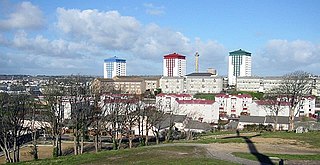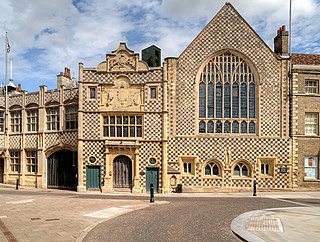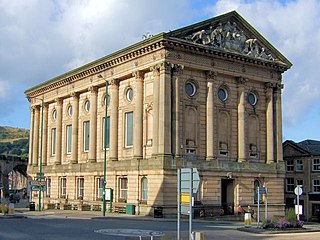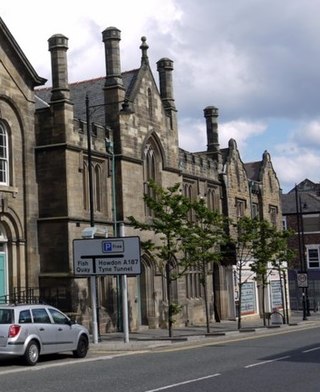
Birkenhead is a town in the Metropolitan Borough of Wirral, Merseyside, England; It was part of Cheshire until 1974. The town is on the Wirral Peninsula, along the west bank of the River Mersey, opposite Liverpool. At the 2011 census, it had a population of 88,818.

Pembroke is a town and community in Pembrokeshire, Wales, with a population of 7,552. The names of both the town and the county have a common origin; both are derived from the Cantref of Penfro: Pen, 'head' or 'end', and bro, 'region', 'country', 'land', which has been interpreted to mean either 'Land's End' or 'headland'.

Hartlepool is a seaside and port town in County Durham, England. It is governed by a unitary authority borough named after the town. The borough is part of the devolved Tees Valley area. With an estimated population of 92,600, it is the second-largest settlement in County Durham, after Darlington.

Poplar was a local government district in the metropolitan area of London, England. It was formed as a district of the Metropolis in 1855 and became a metropolitan borough in the County of London in 1900. It comprised Poplar, Millwall, Bromley-by-Bow and Bow as well as Old Ford, Fish Island and Cubitt Town.

Devonport, formerly named Plymouth Dock or just Dock, is a district of Plymouth in the English county of Devon, although it was, at one time, the more important settlement. It became a county borough in 1889. Devonport was originally one of the "Three Towns" ; these merged in 1914 to form what would become in 1928 the City of Plymouth. It is represented in the Parliament of the United Kingdom as part of the Plymouth Sutton and Devonport constituency. Its elected Member of Parliament (MP) is Luke Pollard, who is a member of the Labour and Co-operative Party. The population of the ward at the 2011 census was 14,788.

West Hartlepool was a predecessor of Hartlepool, County Durham, England. It developed in the Victorian era and took the name from its western position in the parish of what is now known as the Headland.

The Borough of Hartlepool is a unitary authority area with borough status in County Durham, England. Hartlepool Borough Council became a unitary authority in 1996; it is independent from Durham County Council. It is named after its largest settlement, Hartlepool, where the council is based. The borough also includes a rural area to the west of the town. The population of the borough at the 2021 census was 92,571, of which over 95% (87,995) lived in the built-up area of Hartlepool itself.

Ward Jackson Park is a municipal park located in Hartlepool, England. It is named after Ralph Ward Jackson, a local industrialist, who founded West Hartlepool in the 19th century. In later life, Ward Jackson encountered financial difficulties and a fund was established to help him out in his old age. In view of his sudden death, the money collected was used to create a public park. It is Grade II listed in Historic England's Register of Parks and Gardens.

Cambridge Guildhall is a civic building in the centre of the historic city of Cambridge, England. It includes two halls, The Large Hall and The Small Hall, and is used for many disparate events such as comedy acts, conferences, craft fairs, live music, talks, and weddings. It is also used by the University of Cambridge for certain examinations. It is owned and managed by the Cambridge City Council, and it is their seat of government. The Guildhall is located on the south side of Market Hill, the market square in Cambridge, between Peas Hill to the west and Guildhall Street to the east. It is a Grade II listed building.

Huddersfield Town Hall is a municipal facility in Huddersfield, West Yorkshire, England. It is a Grade II listed building.

Yeadon Town Hall is a municipal building in Yeadon, West Yorkshire, England. It is Grade II listed.

King's Lynn Guildhall, more fully referred to as the Guildhall of the Holy and Undivided Trinity, is a municipal building in Saturday Market Place in King's Lynn, Norfolk. It is a Grade I listed building. The building was substantially extended in 1895, with the whole complex now generally known as King's Lynn Town Hall, with the 1895 extension being separately listed at Grade II. It is the usual meeting place of King's Lynn and West Norfolk Borough Council.

Chelsea Town Hall is a municipal building in King's Road, Chelsea, London. The oldest part is a Grade II* listed building and the later part is Grade II listed.

Wimbledon Town Hall is a municipal building in The Broadway, Wimbledon, London. It is a Grade II listed building.

Todmorden Town Hall is a municipal building in Halifax Road, Todmorden, West Yorkshire, England. The town hall, which is the meeting place of Todmorden Town Council, is a grade I listed building.

The Borough Hall is a municipal building in Eastgate Street, Stafford, Staffordshire, England. The borough hall, which formed the headquarters of Stafford Borough Council, is a Grade II listed building.

Tynemouth Town Hall, also known as North Shields Town Hall, is a municipal building in Howard Street, North Shields, Tyne and Wear, England. The town hall, which was the headquarters of Tynemouth County Borough Council, is a Grade II listed building.

Stourbridge Town Hall is a municipal building in Market Street, Stourbridge, West Midlands, England. The town hall, which was the headquarters of Stourbridge Borough Council, is a Grade II listed building.

The Municipal Buildings, also known as the Corn Exchange and Town Hall, are located on the north side of High East Street in Dorchester, Dorset, England. The structure, which incorporates the meeting place of Dorchester Town Council and an arts and community venue, is a Grade II* listed building.

Hartlepool Borough Hall is municipal building, which served as the meeting place of the old Hartlepool Borough Council, before it amalgamated with West Hartlepool County Borough Council. It is located on the Headland, Hartlepool in County Durham, England and is a Grade II listed building.





















